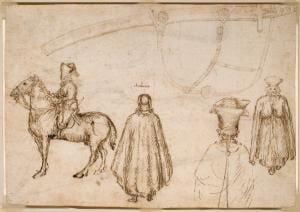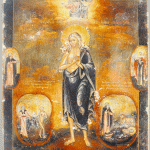
“Let us have no self-conceit, no provoking of one another, no envy of one another” (Gal. 5:26 RSV). We are not to be vainglorious, seeking to set ourselves above others. For, as Paul understood, when we try to glorify ourselves, we create strife. We want people to treat us with special respect. Others will want that respect for themselves, leading them to be envious of those who have it. Such envy should not have a place in the Christian community. We should be looking after and promoting each other, instead of ourselves. We should be working for the common good instead of setting ourselves apart, acting like we are better than everyone else and deserve special respect because of how great we think ourselves to be.
We should flee from whatever transitory honors we receive, knowing the dangers contained in them. For the more we embrace them, we set ourselves up for our own downfall. Others will desire what we have and will do whatever it takes to replace us, and eventually, someone will be successful. If we do not care, if we are not vainglorious, if we shrug off such honor, we will not be hurt when we lose it. Nonetheless, if we care, then not only will be we pained by its loss, we will also hurt many others as we try to hold onto what we cannot always possess. We should, therefore, see such vain honors are worthless, and those who seek to posses them are foolish.
The desert fathers understood the dangers of vainglory. They encouraged humility as a way to overcome that spiritual vice. They often told stories to remind their audience of the true glory which is found in humility, such as the story of a monk who once held a position of authority:
Abba Cronius said that Abba Joseph of Pelusia told him the following story, ‘When I was living in Sinai, there was a brother who was good, ascetic and handsome. He came to church for the synaxis dressed in a little old mafort darned all over. Once when I saw him coming to the synaxis I said to him, “Brother, do you not see the brothers, looking like angels for the synaxis in church? How can you always come here in that garb?” He said to me, “Forgive me, abba, but I have nothing else.” So I took him in to my cell and gave him a tunic and whatever else he needed. After that he wore them like the other brethren and was like an angel to look at. Now once it was necessary for the Fathers to send ten brethren to the emperor about something or other and he was chosen as one of the group to go. When he heard this, he made a prostration before his Father saying, “In the Lord’s name, excuse me, for I am the slave of a great man down there and if he recognizes me, he will deprive me of my habit and force me to serve him again.” The brothers were convinced and left him behind. But later, they learned from some-one who had known him well when he was in the world that he had been head of the administration and that he had spoken as he did as a ruse, so that no-one should know this or bother him about it. So great, amongst the Fathers, was their concern to flee from glory and the peace of this world!’[1]
The monk’s mafort, or cloak, probably came from his time of service with the emperor. He had abandoned everything he had but his clothes on his back, and yet he had to take it off and be given new clothes to represent his new way of life. The story presents a romantic image to us, equating the desert community with angels; we know the reality was far from that ideal, however, that is not to say there was not some truth being used to suggest that ideal. The community allowed many to become better, to become more angelic. Those who took on the spirituality of the desert, those who took on the simple, humble tunic of the desert community, like the monk, could find themselves slowly becoming like angels, but it took time, patience, and much ascetic discipline.
We might wonder whether or not it is strange for a story concerning vainglory to suggest that those who follow the desert spirituality can be glorified. Is this not encouraging a new kind of vainglory to replace the old? Is not the pursuit of humility for the sake of praise self-contradictory? But vainglory is about false glory, and humility helps us overturn such false glory; we are, on the other hand, are called to participate in true glory, to be partakers of the divine nature. It is not glory which is the problem, it is vainglory, the pursuit of transitory glory, which leads us astray. We should abandon the pursuit of human glory, for it is illusory; it does not provide us true glory. Only then will we be free to participate in an experience true glory, the glory of God, a glory which is real and knows no end.
“The wise will inherit honor, but fools get disgrace” (Prov. 3:35 RSV). We are to be co-heirs with Christ, inheriting the honor and glory of God (by becoming a part of the body of Christ). The path of Christ is the path of kenosis, of self-emptying. We empty ourselves in order to receive the bounty of God’s grace. We must not glorify ourselves: that is the key. We empty ourselves of all pretense of self-glory: any attachment to it will cut ourselves off from the full bounty of God’s grace, for by that self-attachment, we cut ourselves off from God. So long as we want whatever glory we can produce for ourselves, we will end up receiving disgrace, for whatever we achieve will be nothing in comparison to what is available to those who participate in the divine life.
The monk, then, in the story had once held a place of power and authority. Eventually, he came to understand how little value was to be had with such human glory. He abandoned his old way of life. He wanted nothing more to do with it. When the monastic community was going to send some monks to visit the emperor, he wanted nothing to do with that mission, since he feared the emperor would want to make him renounce his monastic garb and return to the status he once had.
In order to make sure he did not go, he told his companions he once was a slave to the emperor, and he thought the emperor would force him back into slavery if he went back into the emperor’s presence. In a sense, he was right; the position he had, though filled with earthly honors, nonetheless put him in complete servitude to the emperor; so long as he satisfied the emperor, he was safe from the emperor’s anger and what could come from it. It is the same with all earthly honors; the more we try to accrue honor and wealth, the more we become a slave to the powers that be, for only if and when we satisfy them do we get to keep what we have gained. This is not to say his slavery, or our slavery, is the worst kind of slavery: the worst kind, the kind which we normally think of when we hear the word slave, gives little to no such honor or glory to those who are slaves, but only forces such people to be servants with little to no compensation for their servitude (and lots of potential abuse, if not death, if they do not satisfy their master).
It is interesting to note what the monastic community was willing to do for their fellow monk: they were willing to hide him in the community, giving him a place of security, so that he did not have to go back to being a slave. Escaped slaves often found a place of refuge in the various desert communities. They did not care about slavery. They did not promote it. Rather, they did what they could to undermine it and all the social sin which existed in the world apart from the desert community. Indeed, one of the most famous desert fathers, St. Moses the Ethiopian, was an escaped slave. While Christians in the city often found themselves compromising with sin, allowing the structures of sin in society to dictate to them how they should live, the desert community tried to create a new society, and so served as an example of how Christianity could and should combat the sins of society in the world (alas, of course, the desert was no utopia, and slowly but surely, such social sins infected the desert community and other monastic organizations, until later, we find many monasteries having slaves of their own).
Vainglory is a difficult vice to overcome. We all like to be praised. It feels good. But we must remember how fleeting such praise is and the dangers which come as a result from it. The more fame we generate, the more praise we get, the more danger we face, not only from others, but from ourselves. True honor, true glory, is generated, not by ourselves, but in our union with God. So long as we look to ourselves and narcissistically glorify ourselves , we place a barrier between ourselves and God, preventing us from experiencing that glory and the beatitude which goes along with it.
[1] The Sayings of the Desert Fathers. trans. Benedicta Ward (Kalamazoo, MI: Cistercian Publications, 1984), 116 [Abba Cronius 5].
Stay in touch! Like A Little Bit of Nothing on Facebook.
If you liked what you read, please consider sharing it with your friends and family!













